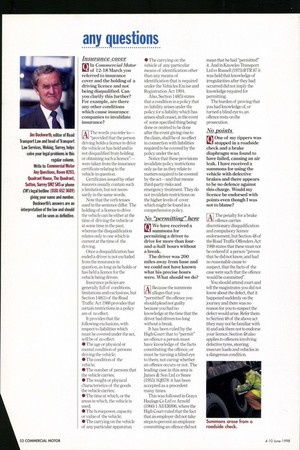any questions Insurance cover In Commercial Motor of 12-18 March
Page 52

If you've noticed an error in this article please click here to report it so we can fix it.
you referred to insurance cover and the holding of a driving licence and not being disqualified. Can you clarify this further? For example, are there any other conditions which cause insurance companies to invalidate insurance?
The words you refer to— "provided that the person driving holds a licence to drive the vehicle or has held and is not disqualified from holding or obtaining such a licence"— were taken from the insurance certificate relating to the vehicle in question.
Certificates issued by other insurers usually contain such a limitation, but not necessarily in the same words.
Note that the verb tenses used in the sentence differ. The holding of a licence to drive the vehicle can be either at the time of driving the vehicle or at some time in the past, whereas the disqualification relates only to one which is current at the time of the driving.
Once a disqualification has ended a driver is not excluded from the insurance in question, as long as he holds or has held a licence for the vehicle being driven.
Insurance policies are generally full of conditions, limitations and exclusions, but Section 148(1) of the Road Traffic Act 1988 provides that certain restrictions in a policy are of no effect.
It provides that the following exclusions, with respect to liabilities which must be covered under the act, will be of no effect: • The age or physical or mental condition of persons driving the vehicle; • The condition of the vehicle; • The number of persons that the vehicle carries; • The weight or physical characteristics of the goods the vehicle carries; • The time at which, or the areas in which, the vehicle is used; • The horsepower, capacity or value of the vehicle; • The carrying on the vehicle of any particular apparatus; • The carrying on the vehicle of any particular means of identification other than any means of identification that is required under the Vehicles Excise and Registration Act 1994.
Also, Section 148(5) states that a condition in a policy that no liability arises under the policy (or a liability which has arisen shall cease), in the event of some specified thing being done or omitted to be done after the event giving rise to the claim, shall be of no effect in connection with liabilities required to be covered by the policy under the act.
Notice that these provisions invalidate policy restrictions only as far as they relate to matters required to be covered by the act—and that means third-party risks and emergency treatment They do not invalidate restrictions on the higher levels of cover which might be found in a comprehensive policy.
No "permitting" here We have received a summons for permitting a driver to drive for more than fourand-a-half hours without a break.
The driver was 200 miles away from base and we could not have known what his precise hours were. What should we do?
A Because the summons alleges that you 'permitted" the offence you should plead not guilty because you had no knowledge at the time that the driver had driven too long without a break.
It has been ruled by the High Court that to "permit" an offence a person must have knowledge of the facts constituting the offence, or must be turning a blind eye to them; not caring whether an offence occurs or not. The leading case in this area is James & Son Ltd vs Smee (1955) 1QB78: it has been accepted as a precedent many times.
This was followed in Grays Haulage Co Ltd vs Arnold (1966) 1 All ER896, where the High Court ruled that the fact that an employer did not take steps to prevent an employee committing an offence did not mean that he had "permitted" it And in Knowles Transport Ltd vs Russell (1975) RTR 87 it was held that knowledge of irregularities after they had occurred did not imply the knowledge required for permitting.
The burden of proving that you had knowledge of, or turned a blind eye to, an offence rests on the prosecution.
No points One of my tippers was stopped in a roadside check and a brake diaphragm was found to have failed, causing an air leak. I have received a summons for using the vehicle with defective brakes and there appears to be no defence against this charge. Would my licence be endorsed with points even though I was not to blame?
A The penalty for a brake offence carries discretionary disqualification and compulsory licence endorsement, but Section 48 of the Road Traffic Offenders Act 1988 states that these must not be ordered if a person "proves that he did not know, and had no reasonable cause to suspect, that the facts of the case were such that the offence would be committed".
You should attend court and tell the magistrates you did not know about the defect, that it happened suddenly on the journey and there was no reason for you to suspect the defect would arise. Refer them to Section 48 of the above act (they may not be familiar with it) and ask them not to endorse your licence. Section 48 also applies to offences involving defective tyres, steering, insecure loads and vehicles in a dangerous condition.




















































































































